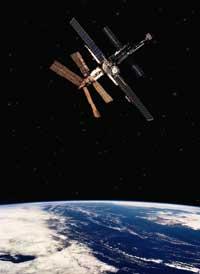Europe free from US orbit

If there is a name related to space, this is Galileo. Galileo Galilei (1564-1642) was an Italian physicist and astronomer who discovered in astronomy the craters of the Moon, the ring of Saturn, the phases of Venus and the four satellites of Jupiter. Subsequently, the name of the astronomer has been occupied for 10 years by the careful spacecraft that will dismantle next year and fulfill its mission to investigate Jupiter and its four large satellites.
But when one dissolves, another project takes the name of Galileo, so much will still be heard when talking about Galileo. Galileo becomes a 30-satellite navigation system funded by the European Union and the European Space Agency (ESA).
Galileo resembles the current American GPS system, but seems to be more accurate. The GPS has a precision of six meters and the new system will have 2 meters. According to Antonio Rodotà, director of ESA, "it is a very important project, as it will be the first collaborative project between ESA and the European Union".
However, although the Transport Ministers of the European Union have recently approved Galileo, ESA scientists have been working on it for a long time. The first satellite is scheduled to be sent in 2004, but will be launched four years later, in 2008.
Multipurpose project

Galileo consists of 30 satellites that rotate the world in an orbit of 23.626 km and at an angle of 56º with the equator. Of these 30 satellites, 27 will be operational and 3 will be reserve. In addition, in Europe there will be two control centers that will control the operation of satellites and navigation system.
But it is not enough for satellites to turn. The user must have a receiver that calculates the distance to the satellites. However, to determine its position, just calculate the distance to the four satellites, three serve to determine the length, latitude and altitude and the fourth to define the so-called timing. Timing reports the exact timing of the location. The information is renewed every six seconds and, as we have said, the accuracy is surprising.

Of course, the applications will be very varied, but like the American GPS or the Russian Glonass, it will be used mainly in all types of transport. These systems allow to determine the route of planes, boats, trucks and cars. For example, the arrival of the ambulance to the place of the accident is much faster, and satellite information can be useful in order not to waste time in a spectacular jam when going on vacation.
Of course, just as we have used the two previous European systems, the information of these 30 satellites can be used worldwide.
Civil vs. military

The effectiveness of the Galileo navigation system is not questioned, but that is not why the project has been approved without debate. The debates were also two areas. On the one hand, because it will endanger practically the entire American monopoly so far, and on the other, because making 30 satellites and sending them into space is not done with four small dogs.
The project has a budget of 3,200-3,400 million euros, which will be paid equally as agreed by the European Union and ESA. According to politicians, this project will help revitalize the European space industry and, in addition, it is estimated that about 100,000 new jobs will be created.
However, although initially the European Union will have to make large investments to carry out Galileo, everything points out that, unlike GPS, Galileo users will have to pay.
But, in addition to the investments of Galileo and the new jobs that will be created, if the Galileo project has been so praised, it is because it will face the American GPS system. Because at the level of precision it will win you and also the project is civil.

The American GPS navigation system and the Russian Glonass are in the hands of the army, and although they are widely used today, armies can, at any time, cut the satellite information collection system. According to the Americans, enemies can use it to launch GPS missiles and, therefore, before any threat or danger it is necessary to have that control.
Galileo, however, is a civil system, not conditioned by possible attacks, so it can be used uninterruptedly 24 hours a day. But if it is not an army, it will have to be financed by another and although the budget of the first phase is agreed, users will have to pay.
Published in 7K.
Buletina
Bidali zure helbide elektronikoa eta jaso asteroko buletina zure sarrera-ontzian











